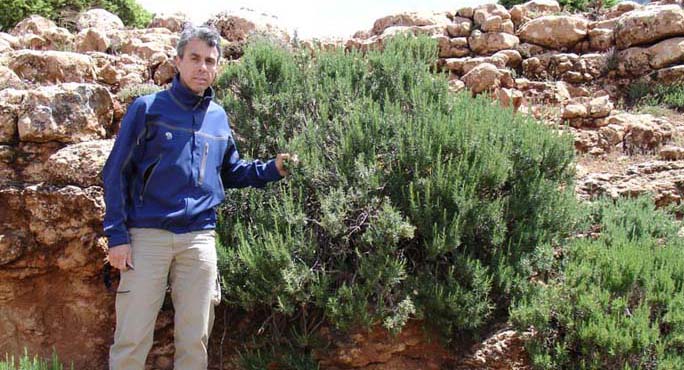Chris with Moroccan Rosemary
The botanical extraction company Naturex, based in Avignon, France, announced the opening of its new corporate foundation in September.1 The Naturex Foundation, created in March 2008, will support projects in countries from which Naturex derives its plant materials.
“Our corporate foundation is a long-term engagement and an extension of our long-standing commitment to responsible corporate citizenship and sustainable development,” said Jacques Dikansky, president and CEO of Naturex and president of the Naturex Foundation, according to a Naturex press release.1 “Although Naturex has already been involved in several sustainable initiatives since its creation, we upgrade to an upper level with the opening of our corporate foundation.”
“For Naturex, the foundation is a line in the sand,” said Chris Kilham, founder of Medicine Hunter Inc. and member of the foundation’s consulting committee (e-mail, November 3, 2008). “It shows a real and practical commitment to communities from whom it derives botanicals and demonstrates real leadership in benefit sharing. Basically, Naturex is voluntarily upholding practices and principles outlined in the international Convention of Biological Diversity. I admire Naturex for stepping up and putting resources into this foundation.”
The foundation has already made a commitment to support 2 community projects. In partnership with the France-based charitable association AgriSud International, it will help fund a project to set up farms to facilitate social and economic advancements for disabled young persons of the Moroccan countryside. The foundation has also partnered with the nonprofit Peruvian association Kalisayas Out Reach to upgrade and improve the dental office and school within the Peruvian town of Ninacaca, as well as provide the town with an Internet center.
“Morocco and the Peruvian highlands are areas from which Naturex derives significant quantities of beneficial botanicals, and in which the company also has excellent community relations,” said Kilham. “Starting out funding projects in these areas makes good practical sense and honors the contribution that these areas make to the global Naturex business.”
Naturex sources several botanical extracts from Morocco, including such wild-harvested culinary and medicinal botanicals as rosemary (Rosmarinus officinalis), thyme (Thymus vulgaris), hawthorn (Crataegus spp.), and chasteberry (Vitex agnus-castus), and such cultivated botanicals as olive (Olea europaea), artichoke (Cynara scolymus), and pomegranate (Punica granatum). “Naturex has a large extraction facility in Casablanca, on the main prolific plain of Morocco, which provides privileged access to abundant raw materials of great quality,” said Antoine Dauby, secretary of the Naturex Foundation (e-mail, October 10, 2008). “This location has strengthened Naturex’s relationship with the Berber and other people who harvest and prepare these herbs.”
The main botanical that Naturex obtains from Peru is maca (Lepidium meyenii). “Naturex sources maca in the central Peruvian highlands, relying on partnerships with local growers,” said Dauby. “Work conducted by Naturex over the past 10 years has helped to transform maca from an unknown herbal product to a well established herbal product in the United States and other countries. This has resulted in economic benefits to the people of the Peruvian highlands.”
According to Dauby, Naturex has allocated a total budget of 150,000 euros (approximately $192,800 USD) to fund projects during the foundation’s first 5 years, after which the foundation will be evaluated in order to continue. According to Kilham, “These projects and others will go on for 5 years. Then the foundation’s activities will be formally scrutinized by government agencies. If Naturex has fulfilled its commitments by law, then the foundation will carry on.” He added, “It will definitely carry on."
Persons who represent a project in line with the foundation’s values and intervention fields are encouraged to fill out a project submission form from the foundation’s website (www.foundation.naturex.com).3 The foundation may choose to support submitted project proposals, pending approval by the executive board and subject to a partnership agreement.
“The Naturex Foundation is a good start,” said Kilham. “It will be successful not only for its projects, but hopefully for influencing other profitable companies to do the right thing and share benefits with communities from which resources are derived. Benefit sharing is not gift-giving. It is an essential component of honest business.”
Naturex was founded in 1992 in France. In 2005 the company purchased PureWorld Inc., a manufacturer of botanical extracts in Bedminster, NJ. More information is available at www.naturex.com
HerbalEGram: Volume 5, Number 11, November 2008
American Botanical Council, 6200 Manor Rd, Austin, TX 78723
Phone: 512-926-4900 | Fax: 512-926-2345 | Email: abc@herbalgram.org


